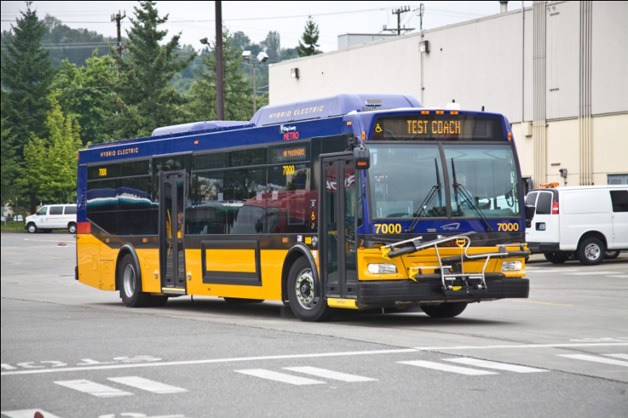The first of 170 new 40-foot hybrid-electric buses operated by King County Metro Transit are hitting the streets this week. The introduction of the Orion buses, manufactured by Daimler Buses of North America, brings Metro to the half-way point in converting its bus fleet to two of the cleanest forms of power available – hybrid technology and non-polluting electricity.
In addition to the Orion buses, the first of 86 New Flyer articulated hybrid-electric coaches are also being placed into service. Riders in South King County will be the first to experience the new hybrids.
“These shorter, 40-foot hybrid coaches are a first for Metro, and the fuel efficiency they bring arrives at a good time,” said King County Executive Dow Constantine. “When combined with our electric trolleys and 60-foot articulated hybrids, more than half of our entire fleet will be either hybrid-electric or fully electric. With today’s high fuel prices, our green fleet is going to save us more than $4.6 million by the end of the year.”
Metro’s goal of having one of the greenest bus fleets in North America began in 2004 when it took delivery of 212 hybrid-electric articulated coaches, which are still in service today.
From the start, Metro knew the hybrids would be winners. The articulated hybrid fleet has consistently achieved a 30 percent increase in overall fuel economy compared to conventional 60-foot diesel buses – that means significantly less fuel used to power Metro’s fleet.
The hybrid fleet has also proven itself in reducing greenhouse gas emissions by 30 percent compared to conventional diesel buses. By year’s end, Metro projects its hybrid fleet will keep nearly 18,000 tons of carbon dioxide from being released into the environment.
The new Orion buses were funded, in part, by $35.8 million federal American Recovery and Reinvestment Act (ARRA) grant. Each new 40-foot hybrid bus cost about $500,000. When fuel costs and performance are considered, Metro projects the new fleet will be more cost-effective in the long run compared to conventional diesel buses.
The first difference Metro riders will notice is the Orion’s low-floor design, making boarding faster and easier. The new buses will also offer a quieter ride. Not only are the Orion’s engines quieter but their battery technology further reduces noise levels.
Customers will also notice a more spacious interior and more contoured seats, making them easier to maintain and repair.
The new Orions will be equipped with GPS technology that will allow the buses to display upcoming stops and provide automated announcements and other customer service messages.
In addition to buses, Metro also plans to acquire 20 all-electric vehicles this year for its Vanpool and Vanshare operations. And it’s helping others go green, as well.
Metro is working with private employers to install approximately 70 electric charging stations throughout the county using a combination of local funds and federal grants. Fifty-four of these charging stations will be available for public use with a bulk of the stations located in park-and-ride garages and rail stations.


